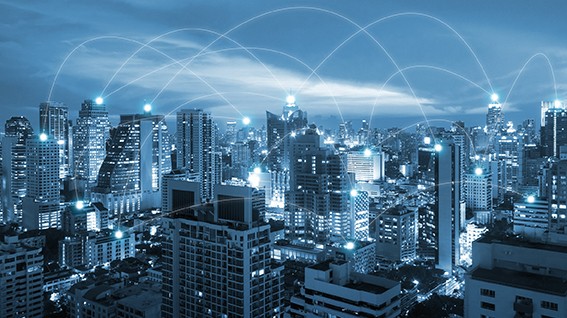Digital Infrastructure - Key to Economic Development
The key to the digital future – of manufacturing, logistics, travel, retail, and communication – is providing secure, low-latency digital infrastructure. Cinia Group’s Jukka-Pekka Joensuu looks at how the new industrial revolution will change the way business is done around the globe.

Source: © Joe Techapanupreeda| shutterstock
Connectivity drives digital evolution
Today’s society is globally more connected than ever. Digitalization is becoming a major theme in every seminar and discussion forum. Why is this so important? Taking a look into our history, innovations have built society more than anything else. Johannes Gutenberg enabled main pillars for modern society and created unintentionally more awareness for what is happening in the world outside your own village. It is fair to say that without Gutenberg, Martin Luther would have just been a rebel priest preaching for a small audience. Instead, he created a religious movement with high impact in many societies.
In today’s society people are more connected than ever. A recent study about “global tribes” indicated that millennials have more in common amongst themselves than within their respective countries and this will have a huge impact on tomorrow’s society.
Furthermore, the impact of machine-to-machine interactions will be even higher. It has been said that whatever can be digitalized, will be digitalized. This means that many of the activities we are performing today will be performed between interacting machines tomorrow.
Taking a concrete example, grocery shopping is one of the routines we do every day. In tomorrow’s world, this whole process can be digitalized so that refrigerators can automatically inform retailers that I am running out of food and that the retailer where I have an account, will fill this order automatically, and most likely do so using robots.
We all know that without connectivity between people, machines, and processes, this evolution can not take place. Therefore, we are more connected than ever and more dependent on connectivity than ever.
Emerging cities – the economic powerhouses of tomorrow
Urbanization and emergence of global cities is a major trend which heavily relies on the global economy driven by megacities like London, Singapore, Hong Kong, and New York. A recent McKinsey study indicates that over 60 % of the world´s GDP is being created in 600 cities around the world. By 2025, 136 new cities are expected to enter the top 600, all of them from the developing world and overwhelmingly—100 new cities—from China.
This will have a huge impact on the whole global economy, and building a smarter society is vital for success and growth. Amsterdam is a very good example of a smart European city , with extensive digital infrastructure and fiber connectivity, several Internet exchange points creating good connectivity between companies and people, and an impressive number of digital companies, start-ups and data centers forming a strong cluster for a smart city concept.
Digital Europe
Europe has made many efforts to become more digitalized and Digital Europe 2020 is envisioned to be created on seven pillars. One of these is digital security and trust. Building digital trust is a major effort for the whole society, trade, and also for people using digital services.
The Finnish government made a major decision on the single digital market in Europe with its investment in the C-Lion 1 cable system between Finland and Germany. This new northern digital highway is connecting natural data center havens in the Nordics with the business and people in continental Europe with low latency, high security, and redundancy
Also other governments have made major efforts in enhancing digital development. Estonia has introduced the idea of digital citizenship and many countries in Europe are pushing digital agendas to create growth in an otherwise stagnating economy. Also, links between Asia and Europe need to be strengthened to promote the huge growth in Asia.
Germany with its strong economic performance and experience in creating industrial champions, especially in the automotive industry will also benefit from the digitalization and the fourth industrial revolution built on the industrial Internet and IoT.
IoT and growth of data
The Internet of Things is really transforming the whole economic structure and changing whole industries. In the financial industry, this rapid development with blockchain and other technologies pose a major threat but also an opportunity to renew the whole industrial approach. This will also have a major impact on other traditional industries. Autonomous driving and steps towards new technologies create a major opportunity not only for how cars are manufactured, but also for how processes are run. Added to this, ownership and usage of cars and car pooling, alongside mobility as a service, will pose a major change with new business opportunities in the new economy.
Connecting the world
The world needs security and trust, but it also needs new innovations. A simple example of mobile phones changing the way we work and interact predicts something about future with augmented reality making better drivers or operators of cars, healthcare applications, and people being able to be their own doctors. All of this is heavily dependent on how well systems work, how interoperability is ensured, and how standards and protocols enable us to trust the applications used. These data-intensive machines and factories are run in data centers which are better and better connected, and business will be more global than ever. Therefore, we have to build more connectivity and the digital bridge between Asia and Europe will become more essential. The Arctic Connect project aims to build a secure subsea route over the Northeast passage, which will enable point-to-point connectivity between Asia and Europe, and will link the megacities of the world together with direct connections. Infrastructure is the key for overall development, and digital infrastructure will be the key to economic development in the future - just as roads and railroads were the creators of past industrial successes.
Jukka-Pekka Joensuu is an internationally recognized telecoms business executive with a proven track record in building next generation services and extensive new network platforms for both mobile and data segments. He is currently working as Executive Advisor for Cinia.
Please note: The opinions expressed in Industry Insights published by dotmagazine are the author’s own and do not reflect the view of the publisher, eco – Association of the Internet Industry.



